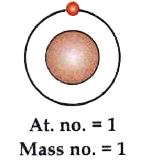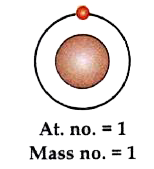Define : Isotopes
Step-by-Step Text Solution:
1. Understanding the Concept of Isotopes:
- Isotopes are variants of a particular chemical element that have the same number of protons but different numbers of neutrons.
2. Defining Atomic Number:
- The atomic number of an element is the number of protons in the nucleus of an atom. This number determines the identity of the element.
3. Defining Mass Number:
- The mass number of an atom is the total number of protons and neutrons in its nucleus. Since isotopes have the same atomic number but different numbers of neutrons, they will have different mass numbers.
4. Example of Isotopes:
- For example, carbon has several isotopes. Carbon-12 (C-12) has 6 protons and 6 neutrons, while Carbon-14 (C-14) has 6 protons and 8 neutrons. Both are isotopes of carbon because they have the same atomic number (6) but different mass numbers (12 and 14, respectively).
5. Chemical Behavior:
- Isotopes of the same element exhibit nearly identical chemical behavior because they have the same number of electrons, which are responsible for chemical reactions.
Final Definition:
Isotopes are two or more species of atoms of a chemical element that have the same atomic number but different mass numbers due to varying numbers of neutrons.
---
- Isotopes are variants of a particular chemical element that have the same number of protons but different numbers of neutrons.
- The atomic number of an element is the number of protons in the nucleus of an atom. This number determines the identity of the element.
- The mass number of an atom is the total number of protons and neutrons in its nucleus. Since isotopes have the same atomic number but different numbers of neutrons, they will have different mass numbers.
- For example, carbon has several isotopes. Carbon-12 (C-12) has 6 protons and 6 neutrons, while Carbon-14 (C-14) has 6 protons and 8 neutrons. Both are isotopes of carbon because they have the same atomic number (6) but different mass numbers (12 and 14, respectively).
- Isotopes of the same element exhibit nearly identical chemical behavior because they have the same number of electrons, which are responsible for chemical reactions.
Isotopes are two or more species of atoms of a chemical element that have the same atomic number but different mass numbers due to varying numbers of neutrons.
Similar Questions
Knowledge Check
Assertion:Isotopes of an element can be separated by using a mass spectrometer.
Reason: Separation of isotopes is possible because of difference in electron number of isotopes .AIf both assertion and reason are true and reason is the correct explanation of assertion .BIf both assertion and reason are true but reason is not the correct explanation of assertion .CIf assertion is true but reason is false .DIf both assertion and reason are false
Assertion: Isotopes of an element can be separated by using a mass spectrometer.
Reason: Separation of isotopes is possible because of difference in electron numbers of isotope.
View SolutionThe diagram represents an isotope of hydrogen (H). Answer the following:
Which sub-atomic particles in the 3 isotopes of 'H' are the same.

View SolutionAssertion: The chemical properties of different isotope are same.
Reason: Isotopes having same number of neutron.
View SolutionA : Isotopes of an element have almost similar chemical properties
R : isotopes have same electron configuration .
View SolutionWhat are isotopes? With reference to which fundamental particle do isotopes differ? Give two uses of isotopes.
View SolutionWhich is different in isotopes of an element?
View SolutionThe diagram represents an isotope of hydrogen (H). Answer the following:
Do isotopes have the same atomic number or the same mass number.

View Solution
